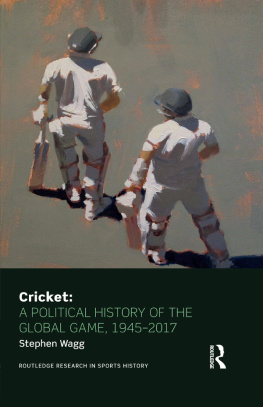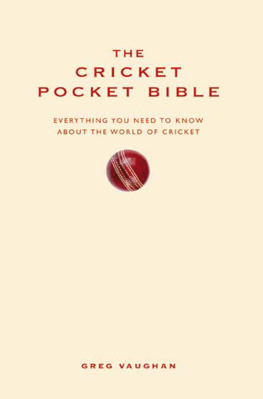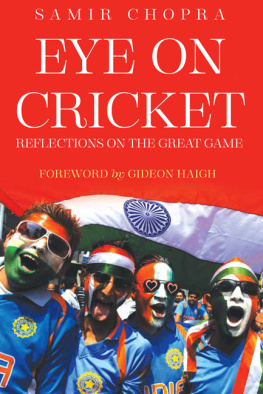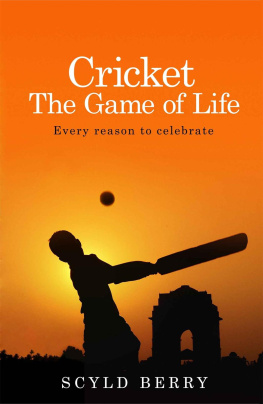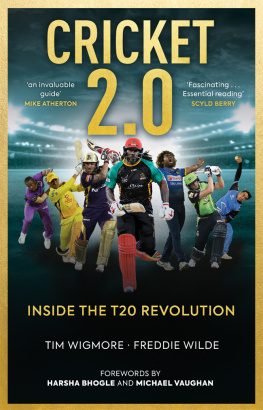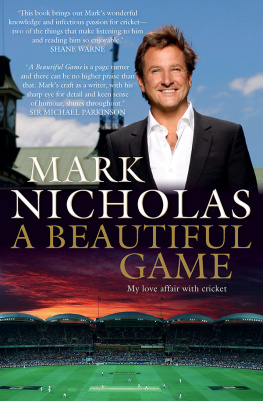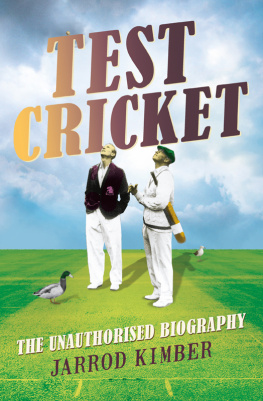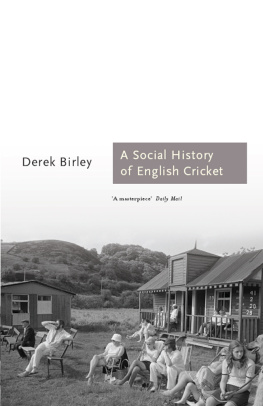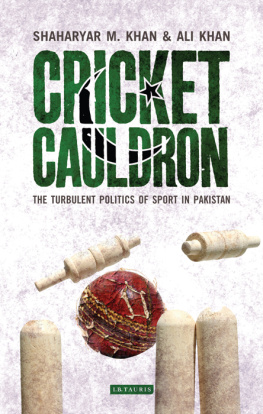
p.i
Building thoughtfully on the work of the late Mike Marqusee, this is an insightful and richly rewarding labour of love. Astutely structured and deftly researched, the book draws on the authors deep knowledge of geopolitical reality and how it manifests itself in post-Imperial cricket, enabling an ambitious brief to be admirably met. At times, indeed, you wonder how the game has survived the context in which it is played. If you want to know why cricket is the worlds most racialized, politicized and fascinating ballgame, look no further. Rob Steen, Senior Lecturer and award-winning sports journalist, University of Brighton, UK
Cricket is one of a few sports where nation vs nation remained a primary contest well into the new millennium. Inexorably tied to a colonial past, cricket also reflected the aspiration of its new nations and nationhoods over the last five decades. In a masterful work of scholarship, Wagg gives us an engaging, comprehensive new history of modern cricket. From the relentless churn of events, achievements and controversies around the cricketing globe, he teases out the sports engagements with the zeitgeist: the tussle between the old world and the new, the tumult of race and gender, the advent of professionalism, globalisation and the corporatisation of cricket. As much as the book is about modern cricket around the world, Wagg has also skilfully identified the worlds footprints on modern cricket. Sharda Ugra, Senior Editor, ESPNcricinfo and ESPN India
p.iii
Cricket: A Political History of the Global Game, 19452017
Cricket is an enduring paradox. On the one hand, it symbolises much that is outmoded: imperialism; a leisured elite; a rural, aristocratic Englishness. On the other, it endures as a global game and does so by skilful adaptation, trading partly on its mythic past and partly on its capacity to repackage itself. This ambitious new history recounts the politics of cricket around the world since the Second World War, examining key cultural and political themes, including decolonisation, racism, gender, globalisation, corruption and commercialisation.
Part One looks at the transformation of cricket cultures in the ten territories of the former British Empire in the years immediately after 1945, a time when decolonisation and the search for national identity touched every cricket playing region in the world. Part Two focuses on globalisation and the games evolution as an international sport, analysing: social change and the Ashes; the campaigns for new cricket formats; the development of the womens game; the new breed of coach; the limits to the games global expansion; and the rise of India as the worlds leading cricket power.
Cricket: A Political History of the Global Game , 19452017 is fascinating reading for anybody interested in the contemporary history of sport.
Stephen Wagg is a professor in the Carnegie School of Sport at Leeds Beckett University, UK.
p.iv
Routledge Research in Sports History
The Routledge Research in Sports History series presents leading research in the development and historical significance of modern sport through a collection of historiographical, regional and thematic studies which span a variety of periods, sports and geographical areas. Showcasing ground-breaking, cross-disciplinary work from established and emerging sport historians, the series provides a crucial contribution to the wider study of sport and society.
Available in this series:
4 Making Sport History
Disciplines, Identities and the Historiography of Sport
Edited by Pascal Delheye
5 A Social History of Tennis in Britain
Robert Lake
6 Association Football
A Study in Figurational Sociology
Graham Curry and Eric Dunning
7 Taekwondo
From a Martial Art to a Martial Sport
Udo Moenig
8 The Black Press and Black Baseball, 19151955
A Devils Bargain
Brian Carroll
9 Football and Literature in South America
David Wood
10 Cricket: A Political History of the Global Game, 19452017
Stephen Wagg
www.routledge.com/sport/series/RRSH
p.v
Cricket: A Political History
of the Global Game,
19452017
Stephen Wagg

p.vi
First published 2018
by Routledge
2 Park Square, Milton Park, Abingdon, Oxon OX14 4RN
and by Routledge
711 Third Avenue, New York, NY 10017
Routledge is an imprint of the Taylor & Francis Group, an informa business
2018 Stephen Wagg
The right of Stephen Wagg to be identified as author of this work has been asserted by him in accordance with sections 77 and 78 of the Copyright, Designs and Patents Act 1988.
All rights reserved. No part of this book may be reprinted or reproduced or utilised in any form or by any electronic, mechanical, or other means, now known or hereafter invented, including photocopying and recording, or in any information storage or retrieval system, without permission in writing from the publishers.
Trademark notice : Product or corporate names may be trademarks or registered trademarks, and are used only for identification and explanation without intent to infringe.
British Library Cataloguing-in-Publication Data
A catalogue record for this book is available from the British Library
Library of Congress Cataloging-in-Publication Data
Names: Wagg, Stephen, author.
Title: Cricket : a political history of the global game, 1945-2017 / Stephen Wagg.
Description: Milton Park, Abingdon, Oxon ; New York, NY : Routledge, 2018. | Includes bibliographical references and index.
Identifiers: LCCN 2017024353| ISBN 9781138839854 (hardback) | ISBN 9781315733210 (ebook)
Subjects: LCSH: CricketHistory. | CricketPolitical aspects.
Classification: LCC GV913 .W33 2018 | DDC 796.35809dc23
LC record available at https://lccn.loc.gov/2017024353
ISBN: 978-1-138-83985-4 (hbk)
ISBN: 978-1-315-73321-0 (ebk)
Typeset in Sabon
by Swales & Willis, Exeter, Devon, UK
p.vii
In Memoriam
Stephen and Elizabeth Wagg, Ted and Florrie Hardy, my grandparents
Tom and Anne Wagg, my father and mother
Mike Marqusee, who spoke truth to cricket power
p.xi
My thanks to:
Simon Whitmore for the chance to write this book.
Tony Collins, Ron Greenall, Jon Gemmell, Willem Van Schendel, Sharda Ugra, Raf Nicholson, Dil Porter and Rob Steen for reading and commenting on drafts of what Id written.
Robert Curphey in Lords library for his friendly assistance.
Kausik Bandyopadhyay for sending me his article on Bangladeshi cricket.
Ivor Dembina for longstanding friendship and a place to stay.
My friends at Grace Road and Dunton Bassett for always-enjoyable cricket conversation.
Helen Cooper for kindly allowing her artwork to be shown on the cover.
Catherine Hanley for editorial help.
p.1
To an extent apparently unparalleled in the world of sport, international cricket bears the contours of the old British Empire. Aside from the Mother Country herself, all the nine countries entitled to play Test cricket are either former British dominions or colonies. This section will consist of nine chapters which will detail the development after the Second World War of cricket cultures in these ten countries. This development took place largely against a backdrop of decolonisation, a process by which no cricket culture in the world was unaffected.
p.3
This chapter will look at the social and political progress of English first-class cricket since the Second World War. It will draw on the manifold histories of the English game, in particular those by the American-born Marxist writer Mike Marqusee And Francis Wheen, in his foreword to Marqusees book Anyone But England , argued that the Marylebone Cricket Club (MCC), for much of its history the stewards of English cricket, who are usually denounced as fossilised reactionaries were:
Next page
